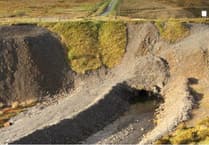Gwynedd is home to dozens of people believed to have fled conflict or faced persecution in other countries, figures show, as the UK prepares to welcome more people fleeing the war in Ukraine.
The Government has launched a new sponsorship scheme, which will let ordinary people, charities and businesses provide a safe space for Ukrainians who do not have family ties in the UK.
Home Office data shows Gwynedd communities have already welcomed 44 refugees as part of other resettlement schemes since 2014, including five who arrived last year.
The figures show they were all accommodated via the Vulnerable Persons Resettlement Scheme, which was established in 2014 to provide sanctuary to Syrian refugees.
After resettling more than 20,000 refugees in local authority areas across the country, the VPRS was replaced in February 2021 by the UK Resettlement Scheme, which has yet to place anyone in Gwynedd.
A Home Office spokeswoman said the Government had a “proud history” of supporting people in need and protecting the most vulnerable.
However, the chief executive of charity Refugee Action has urged MPs to back a Lords amendment to the Government’s proposed Nationality and Borders Bill to support more refugees and create a commitment to resettle 10,000 every year.
Tim Naor Hilton said cuts to resettlement schemes had left local authorities struggling to invest in refugee services and said the amendment could improve the country’s response to those escaping conflict.
Separate figures show asylum applications in the UK increased by 63% to 48,540 in 2021 – the highest number in almost two decades.
While awaiting a decision, asylum seekers are unable to work but can be entitled to financial assistance and accommodation through what is known as Section 95 support.
Around 54,700 asylum seekers across the UK were receiving Section 95 support at the end of last year, but none were recorded in Gwynedd.
Figures for both refugees and asylum seekers could be higher as not all existing resettlement schemes and forms of support are represented in the data.
Enver Solomon, CEO of the Refugee Council said the increase was unsurprising, because “where there is war, conflict and violence, there will be people desperately seeking safety.”
He called on the Government to tackle a rise in people waiting over six months for a Home Office decision, adding: “The UK’s response must be an asylum system that is fair, humane and orderly – a system that processes claims in an efficient and timely manner, granting protection to those who need it and for those who don’t, enabling them to return safely and with dignity to the country from which they came.”
The data shows disparities around the placement of people within local authority areas, with asylum seekers representing fewer than one in every 100,000 people in Gwynedd, compared to 705 in every 100,000 in Glasgow, according to the latest population estimates.
The Government spokeswoman said it is working with councils to ensure asylum seekers are distributed fairly around the UK, adding: “Our new plan for immigration will fix the broken asylum system, making it fair to those who need our help and firm on those who abuse our hospitality.”
The figures do not include those resettled via the recently established Afghan Citizens’ Resettlement Scheme.




